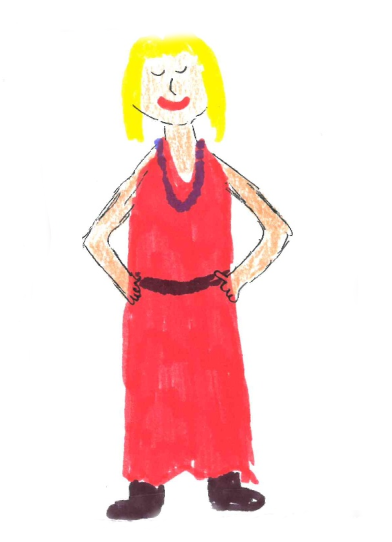Rigby – my adolescent trans girl
Trigger warning: child abuse and childhood sexual abuse

When I recently made the fanzine of La Rigby, drawing and writing it, I realised that Rigby is a girl and not a boy. Probably, when you read the zine, you realise that at one point the pronoun with which I refer to Rigby changes, to La Rigby. But La Rigby is not just a girl, she is a trans girl.
Since then, a lot of emotions are coming up for La Rigby and for me. Mostly pain and sadness, but also fear. The fear of years of hiding, of wearing a mask. And, as my psychologist recently told me in therapy: living with a mask is like not living at all.
Last week I went to the presentation of the book La mala costumbre by Alana S. Portero. It is a book about the childhood and adolescence of a trans girl in a working class neighbourhood in Madrid - and it is much more. When, during the book presentation, Alana was asked why there is nothing about school or high school in the book, she replied that in high school you dissociate, and that she doesn't know how to write about it. And what if your whole adolescence, decades of your life, you dissociate? When you dissociate, you don't feel anything, but the emotions don't go away. They stay stored in your body and come out, in the form of somatisations or, years or decades later, when you reconnect with these emotions. And this is happening now to La Rigby, to me. All the pain is coming out, all the fear of living with a mask, of not living.
La Rigby was not able to come out as a trans girl at the time. She was very aware of what had happened with Alex, of the sexual abuse that Zora suffered. She knew that gender dissidence would cost her dearly. And she was not able to sustain this. So, a life in the closet, with the mask of a boy, a mask that in reality didn't protect her either, that didn't work either.
Now, La Rigby is crying a lot. When I hug her, she starts to cry, the pain of years in the closet, of years of not living, starts to come out. But sometimes she also smiles shyly, especially when I complement her on her red dress. She likes to see herself in her dress, sometimes she twirls around to show off, shyly, but also proud of herself. La Rigby. At last, free to express herself, free to live as who she is.
A lot of things come up for me. I now understand my struggle with and against masculinity in a different way. Three years ago (!) I wrote about the trauma of masculinity, but now, with my teenage trans girl, I see everything in a very different way. It's one thing not to fit in, but to feel like a boy, and another thing to feel like a girl, a trans girl, and to have to wear the mask of a boy all the time. Three years ago, referring to the book How to Understand Your Gender by Alex Iantaffi and Meg-John Barker, I wrote: "Yesterday I started chapter 3 of the book, Your Gender Background, and they propose as a little reflection to think about the impact of sex assigned at birth, and thinking about this almost brought tears to my eyes.
At birth I was assigned the sex 'male', with all that this means for life. Honestly: bullshit. At least for me."
Of course it sucked, as I was a girl. A trans girl, but a girl. And, I got to cry, cry for a life not lived. Cry for all the pain of living with a mask. Cry for the bullying, for the fear. It hurts. It hurts so much.
I know this will pass. Rigby and I need time. We need to hold each other, cry together. Let go of the pain, get through the grief. Because, it's all in the past now. We have survived it. We are free now, we are resilient. We are proudly queer, trans, non-binary. And we fight for a better world, a queer world.
